5 Secret Side Effects of Hiking More Right Now, Science Says
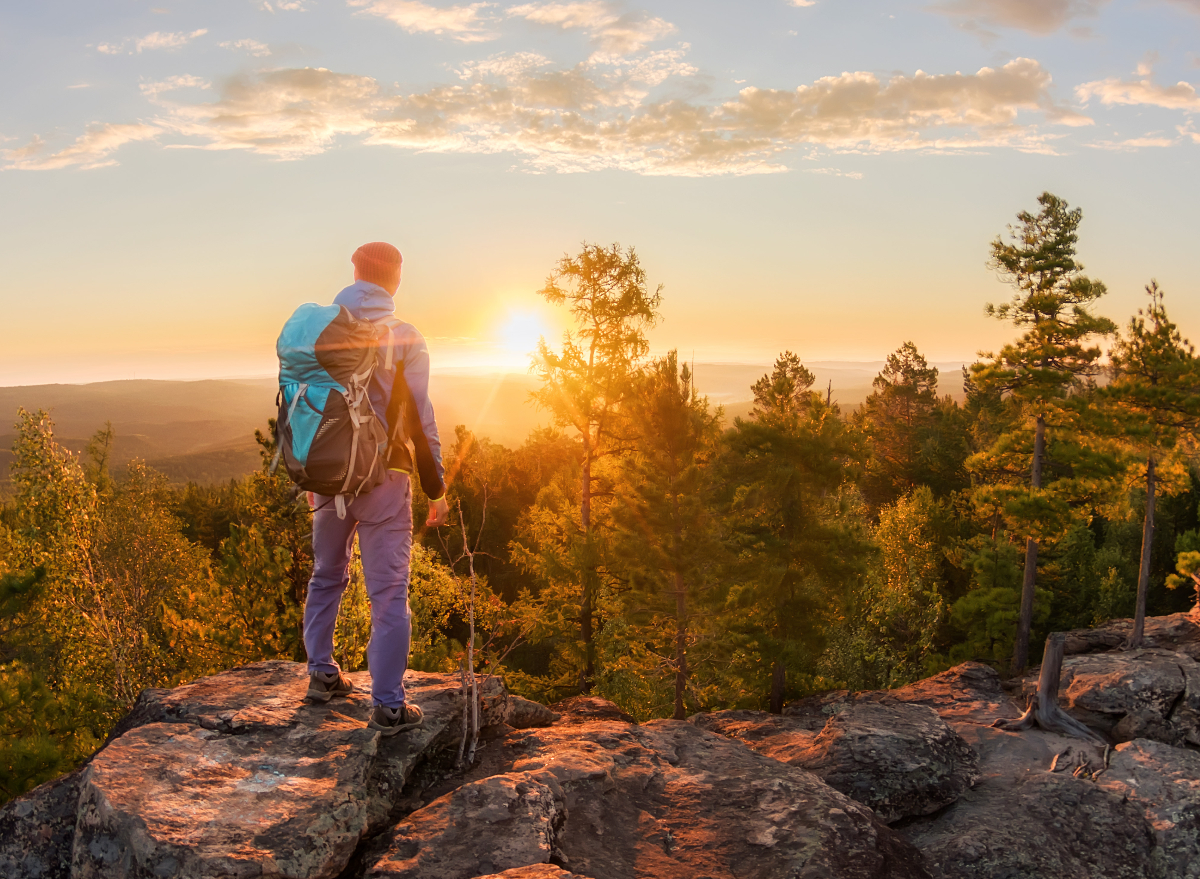
Once winter is over, it’s prime time to rejoice, but also to plan long weekend getaways in the spring. What better way to spend your downtime than by doing something healthy in the beautifully refreshing, great outdoors? Hiking enthusiasts already know the many pleasures you can experience from taking a brisk hike along a challenging trail or up a peaceful, picturesque mountain. But are you aware of the secret side effects of hiking more? If not, we’re here to clue you in.
The best part about this outdoor activity is that it can be enjoyed at any age and stage of life, regardless of skill. Not to mention, there are over 400 national parks to choose from in every part of the United States, each offering its own unique challenges and beauty that can suit whatever getaway you may be looking for. In addition to enjoying an amazing getaway, you will derive more proven health benefits from taking a hike than you ever knew possible. This fun activity will not simply give your calves, thighs, abs, and glutes a solid workout—it will give you so much more.
So, grab your backpack, pack up some healthy snacks, put on your hiking boots, and let’s go take a hike! Let’s explore the secret side effects of hiking more, and next, check out The 6 Best Exercises for Strong and Toned Arms in 2022, Trainer Says.
You’ll exert your body’s core muscles and fine-tune your balance
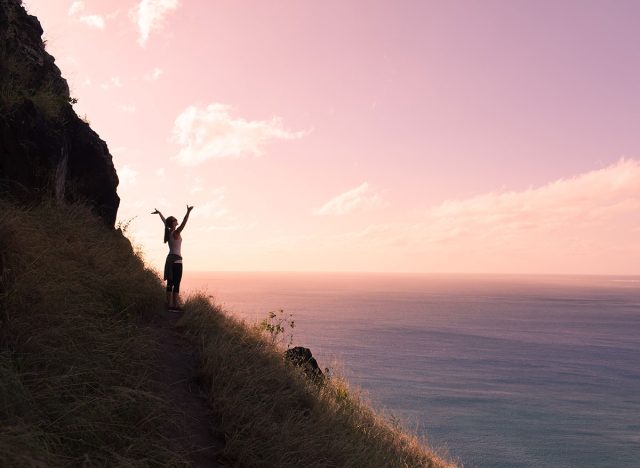
Hiking is a terrific source of cardio. The more hills you can include on your route, the better workout you will have. Anytime you step up your cardio fitness routine, you will help your heart work more vigorously. Taking on a natural flow of inclines and declines will exert your body’s core muscles while fine-tuning balance, since the varied lateral movement you will hit up on an irregular trail surface is very different from that of a treadmill, as Dr. Aaron L. Baggish, associate director of the Cardiovascular Performance Program at Harvard-affiliated Massachusetts General Hospital, explained to Harvard Health Publishing.
Related: 5 Best Health Benefits of Walking, Says Science
Being in the great outdoors has been proven to ease stress and anxiety
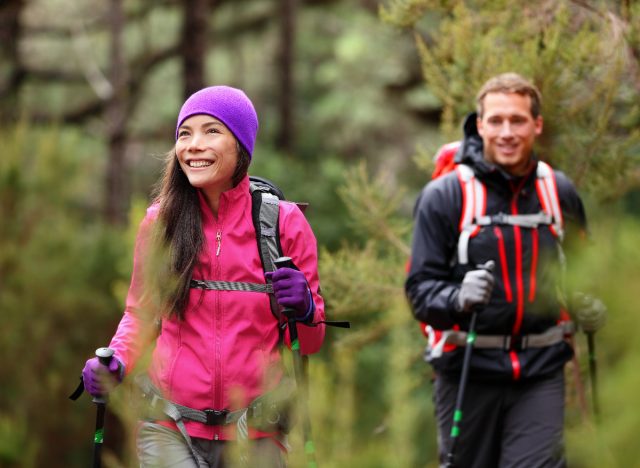
Whether you choose to hike down the Grand Canyon or opt for a small trail at your local state park, it’s been proven that simply being in the great outdoors—aka nature—can ease your stress, anxiety, and depression. By hiking, you will decrease your possibility of high blood pressure (hypertension) by as much as 4 to 10 points. As reported by the American Hiking Society, close to 33% of adults in the U.S. have hypertension—the “silent killer.” It’s given that name because the symptoms typically go unnoticed and can cause a stroke, heart attack, and other critical health issues.
You’ll increase your chances of living longer
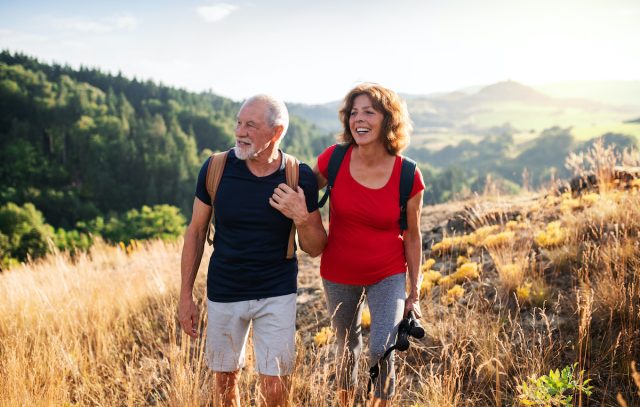
The next time someone tells you to “go take a hike,” honestly, embrace it and take their advice! By doing so, you can actually increase your chances of living longer. Studies reveal that when you regularly perform physical activities, you dramatically reduce your chances of developing a chronic illness, including diabetes and colon cancer. Living a healthy, active lifestyle can lower your chance of passing away from coronary heart disease as well.
Hiking is a great exercise for weight loss
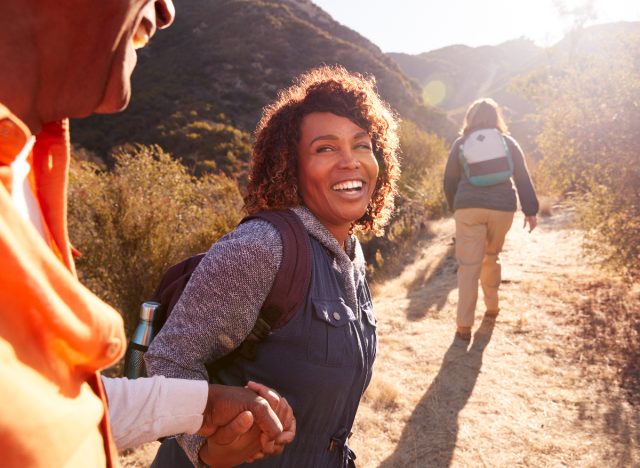
If you’re looking to shed some pounds, hiking is a great choice. (LiveStrong actually dubs it “one of the best” weight loss activities.) In fact, achieving the bodyweight that’s considered normal for you will help avoid the high blood pressure we spoke of earlier, according to the American Hiking Society. Planning a weekend getaway with your best friends or family will help you maintain healthy muscles, joints, and bones, too.
Related: The One Type of Walking You’re Not Doing Enough Of, Says Science
A brisk—and safe—hike can help people suffering from arthritis
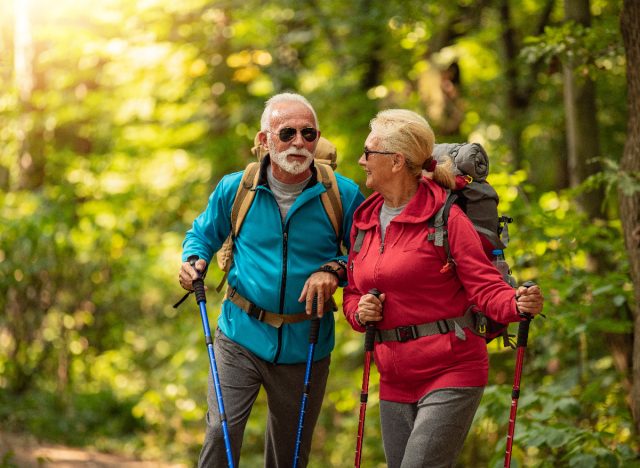
If you are prone to or suffering from arthritis, a safe, brisk hike can actually help quite a bit and assist in alleviating any pain you may have. When you’re hiking, you’re keeping the joints active while maintaining the strength of the muscles around them.
Hiking can apparently build your bone density, slow down the loss of calcium, and make your bones stronger, Adam Rivadeneyra, MD, a sports medicine specialist at Hoag Orthopedic Institute in Orange, California revealed to Practical Pain Management.
Of course, you need to take the proper precautions. If you have arthritis, be sure to wear high-quality footwear that’s very supportive. You should also consider bringing along walking poles. And choose your route wisely. Rivadeneyra noted to avoid any trails with a lot of large rocks, and choose a path that’s marked well.
We’re guessing you don’t need further convincing! A hiking adventure is an extraordinary plan that will be filled with goodness for your overall general health, so check out some trails and start a bucket list of ones you’d like to try.